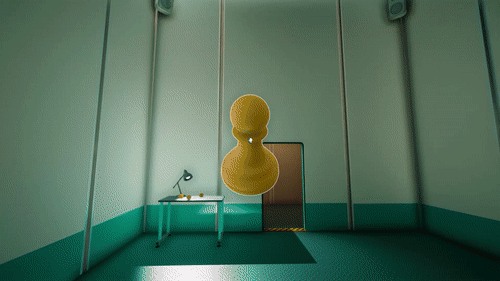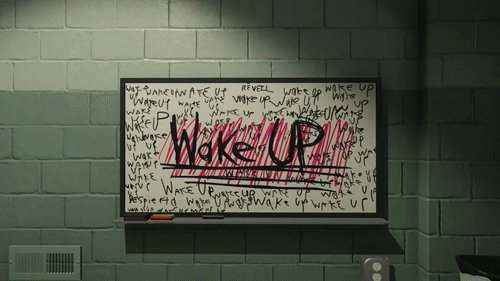
Tags: First-Person, Walking Simulator, Puzzle, Linear Story
First, a mini-disclaimer. I did not purchase Superliminal or play through the game. I did, however, watch someone else complete it. Thus, gameplay-related satisfaction, frustration, and revelation doesn’t apply in my case. Even though I never had control of the game, I still found its content thought-provoking enough to warrant sharing. Hence, “Secondhand Thoughts.”
Also, there will be non-hidden spoilers. Read at your own discretion.
In Superliminal, the player traverses several dreams, always seeking the exit. What begins as a guided therapy test, turns into a mischievious little exploration, then – an anxious escape as both the environment and the narrator become more and more unreliable. The path to progress isn’t always laid out, so players must create their own by manipulating interactable objects. Those fond of The Stanley Parable, the Portal series, and Quantum Conundrum might enjoy this one as well.
Many of the mechanics in Superliminal rely on the player changing their in-game perspective. A chesspiece may appear small when held by a nearby table, but may appear large when held up against a far-off wall. A die may appear fragmented from one angle, but complete and interactable from another. A doorway may appear to lead out into the vast sky, but the sky is then revealed to be a human-sized cardboard cut-out.

Superliminal’s focus on manipulating perception and visual illusions is what made it fascinating to me. “Perception is Reality,” the game repeatedly reminds the player. Construct and deconstruct visual illusions to move forward.
Move forward, indeed. Because, despite the seemingly unending number of dreams the player witnesses, no matter how they solve or bypass each puzzle, in reality it all leads up to the game’s single ending: the realization that the entire dream therapy session was scripted. Exploration? To aid puzzle-solving, by encouraging players to test the perceived conventional limits of their environment. Escape? To foster confidence in the player’s independence, by removing trust and – subsequently, dependency – on another entity.

However omnious anything appears, there’s little to fear. Superliminal has a positive, heart-warming ending. Where it falls short, where every linear story falls short, is replayability.
To clarify, replayability has minimal effect on whether I like or dislike a title. Superliminal, Portal, Quantum Conundrum – I would consider lacking in replayability thanks to a linear plot development, but still decently entertaining games in terms of story and first-time gameplay. The Stanley Parable, despite its multitude of choices, still only has a finite number of endings. Amusing and confounding as those endings are, once they are thoroughly explored, it purges any reason to pick up the game again.
The other thing with linear story games is the lack of substance-driven updates / patches. Once the ending is reached, that’s pretty much it, full-stop. Sometimes there’s a DLC, a sequel, a prequel, a spin-off, or a spiritual successor, but there’s very little additional content for the fixed amount the player’s paid for that one game.
So, a lack of replayability makes it incredibly difficult for me to recommend that others pick up the game. Why bother spending money on or investing time in a game, when all the player’s choices are fixed, and when there is only one or a finite number of endings? Just watch a playthrough. Pull up a non-commentary 100% run, kick it up to 2X the speed, and you can breeze through the entire game in an hour or two.
Though, a compelling story and varied enough gameplay might be enough to offset a linear plot, perhaps. A number of my favorite games are RPGs with finite endings, and I’m thinking that an in-depth lore / world, and the unpredictable challenge of battles / combat might be the tipping factor.
![]()
Admittedly, after that long spiel, I not sure what sort of note I was planning to end this post on. ![]()
I’m not really here to suggest that Superliminal change its story or gameplay to make it more marketable. I like its concept, and I like its execution; I think both were done superbly well (super-bly, eh? ![]() ). Most of its puzzles were more-or-less “original” or adapted from existing illusions (albeit repetitive, in certain areas). At the very least, the devs didn’t rely on copying-and-pasting M.C. Escher’s works into their game.
). Most of its puzzles were more-or-less “original” or adapted from existing illusions (albeit repetitive, in certain areas). At the very least, the devs didn’t rely on copying-and-pasting M.C. Escher’s works into their game.
It caters to my interest in mind games and optical illusions, so I found it intruiging. I can’t say whether it’s worth $20, though, for a walking simulator with a single ending (estimated play time: 2 - 3 hours).
Check it out, if the .GIFs look interesting, I guess? It’s on Steam, if you’d like the firsthand experience. There’s also multiple commentary and non-commentary playthroughs of it on YT, for those on-the-fence about it.